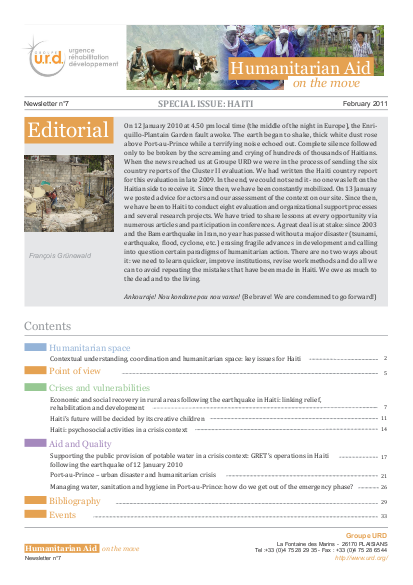
On 12 January 2010 at 4.50 pm local time (the middle of the night in Europe), the Enriquillo-Plantain Garden fault awoke. The earth began to shake, thick white dust rose above Port-au-Prince while a terrifying noise echoed out. Complete silence followed only to be broken by the screaming and crying of hundreds of thousands of Haitians.
When the news reached us at Groupe URD we were in the process of sending the six country reports of the Cluster II evaluation. We had written the Haiti country report for this evaluation in late 2009. In the end, we could not send it - no one was left on the Haitian side to receive it. Since then, we have been constantly mobilized. On 13 January we posted advice for actors and our assessment of the context on our site. Since then, we have been to Haiti to conduct eight evaluation and organizational support processes and several research projects. We have tried to share lessons at every opportunity via numerous articles and participation in conferences.
A great deal is at stake: since 2003 and the Bam earthquake in Iran, no year has passed without a major disaster (tsunami, earthquake, flood, cyclone, etc.) erasing fragile advances in development and calling into question certain paradigms of humanitarian action. There are no two ways about it: we need to learn quicker, improve institutions, revise work methods and do all we can to avoid repeating the mistakes that have been made in Haiti. We owe as much to the dead and to the living.
Resource collections
- Earthquakes
- Learning from crises
- UN Habitat - Urban Response Collection
- Urban Response - Urban Crisis Preparedness and Risk Reduction
- Urban Response Collection - Community Engagement and Social Cohesion
- Urban Response Collection - Economic Recovery
- Urban Response Collection - Environment and Climate Change
- Urban Response Collection - Housing, Land and Property
- Urban Response Collection - Urban Crisis Response, Recovery and Reconstruction
- Urban Response Collection - Urban Resilience